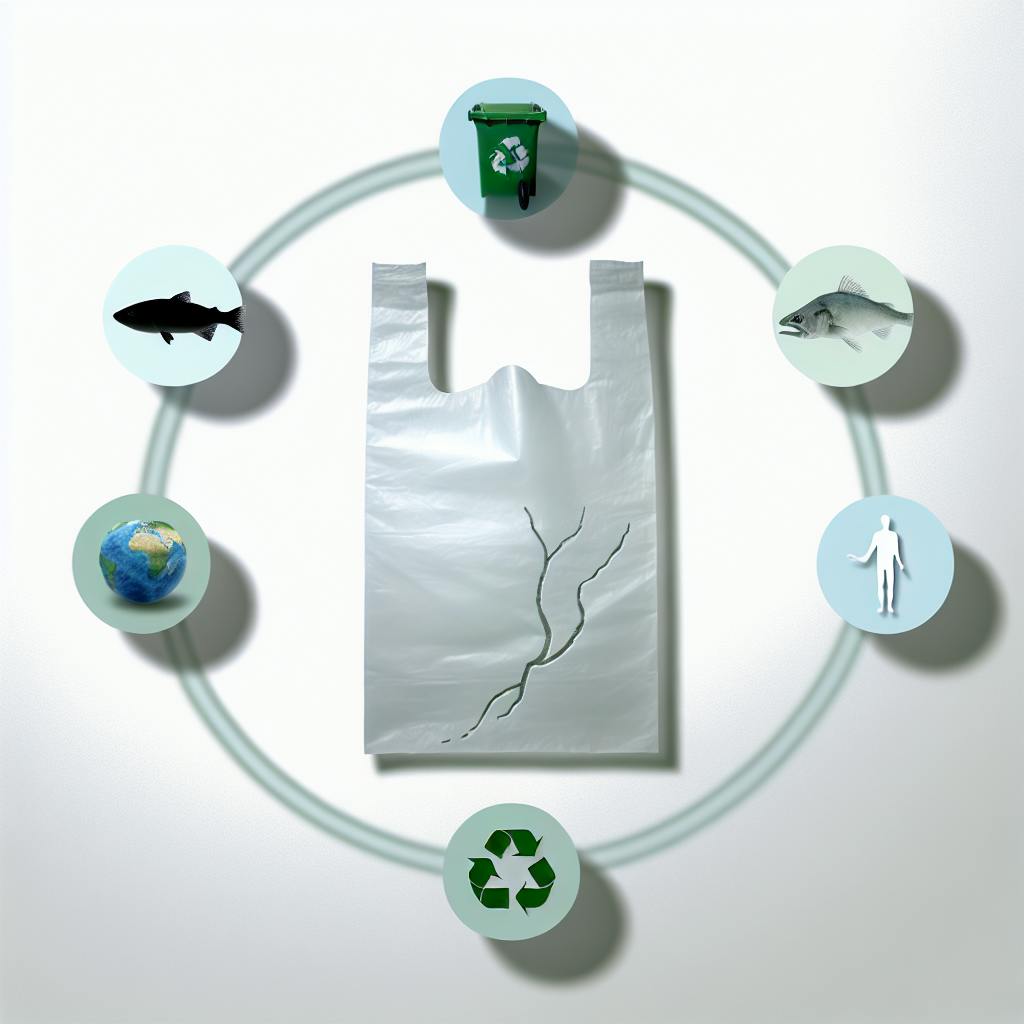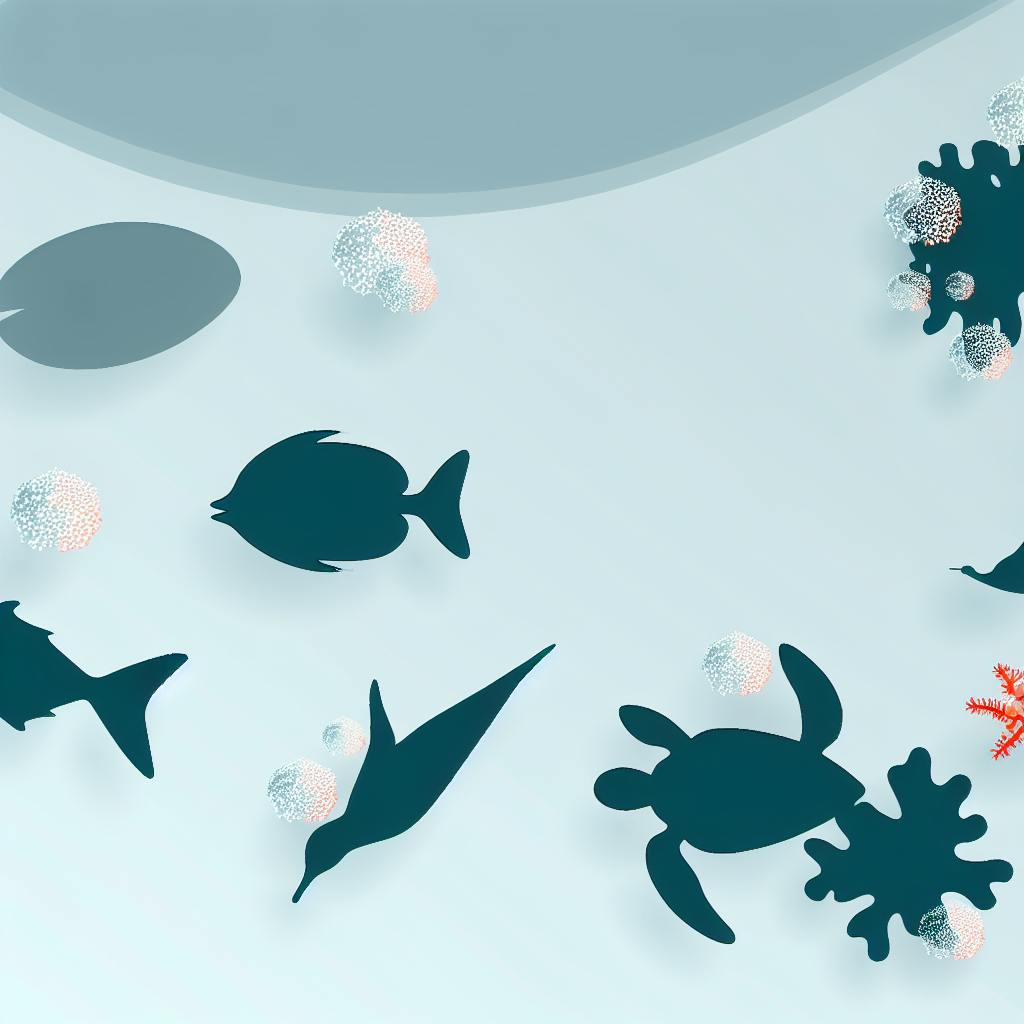Microplastic pollution is a major environmental threat. These 5 NGOs are leading the fight against it globally:
-
5 Gyres Institute: Focuses on science, education, and community solutions. Key achievements:
- Led #BeadFree campaign, helping pass The Microbead-Free Waters Act of 2015
- Created local coalitions like Reusable LA and Austin Reuse Coalition
- Contributed to plastic pollution reduction bills and policies
-
The Ocean Cleanup: Develops advanced technologies to collect plastic debris from oceans. Key achievements:
- System 03 collects plastic pollution at record levels
- Deployed Interceptor systems in rivers to prevent ocean plastic pollution
- Partnered with major companies and governments
-
Plastic Soup Foundation: Dedicated to reducing ocean plastic contamination. Key achievements:
- Beat the Microbead campaign, supported by 85 NGOs in 35 countries
- Promotes education and disseminates research on plastic pollution solutions
-
Parley for the Oceans: Collaborates with creators, thinkers, and leaders to end ocean destruction. Key achievements:
- Collaborations with global brands like adidas, Dior, and American Express
- Created artist edition flags made from Ocean Plastic®
- Developed 3D printing applications using Ocean Plastic®
-
Surfrider Foundation: Protects oceans, waves, and beaches. Key achievements:
- Beach Cleanup Program removed 29,966 pounds of trash in 2024
- Advocates for policies reducing plastic production and promoting sustainability
- Ocean Friendly Restaurants initiative certifies sustainable businesses
By supporting these NGOs through donations, volunteering, and sustainable choices, you can contribute to the global effort against microplastic pollution.
1. 5 Gyres Institute
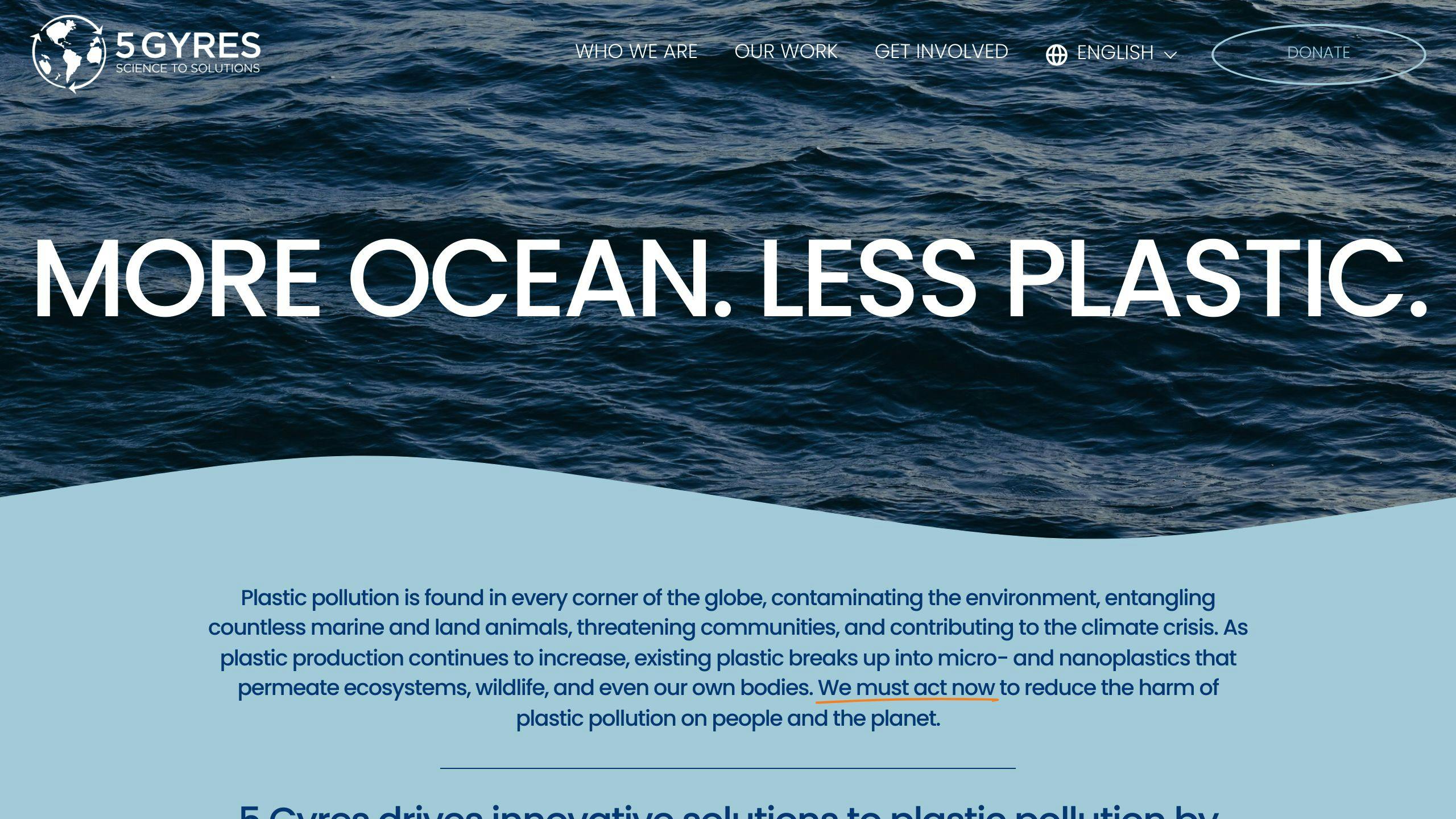
Mission and Approach
The 5 Gyres Institute is a non-profit organization founded in 2009 by Anna Cummins and Marcus Erikson. Their goal is to combat plastic pollution through science, education, and adventure. They focus on researching plastic pollution and finding community-driven solutions.
Key Achievements
Here are some of the 5 Gyres Institute's notable achievements:
- Led the #BeadFree campaign, which helped pass The Microbead-Free Waters Act of 2015
- Created local coalitions, including Reusable LA and Austin Reuse Coalition
- Contributed to the passing of several local and state bills, including:
- An expanded polystyrene ban in Los Angeles
- Returnable beverage bottle systems in California
Educational Initiatives
The 5 Gyres Institute offers various educational programs, including:
- Trash Academy: a STEM curriculum for students
- Ambassador programs: engaging individuals in the fight against plastic pollution
- Community initiatives: promoting community involvement in reducing plastic waste
Innovative Strategies
The 5 Gyres Institute has adapted to changes, including:
| Challenge | Response |
|---|---|
| Executive Director change | Focused on "upstream solutions" to answer key scientific questions |
| Fundraising department changes | Converted in-person educational curriculum to an online format |
| Pandemic | Shifted to online events and focused on community engagement |
2. The Ocean Cleanup
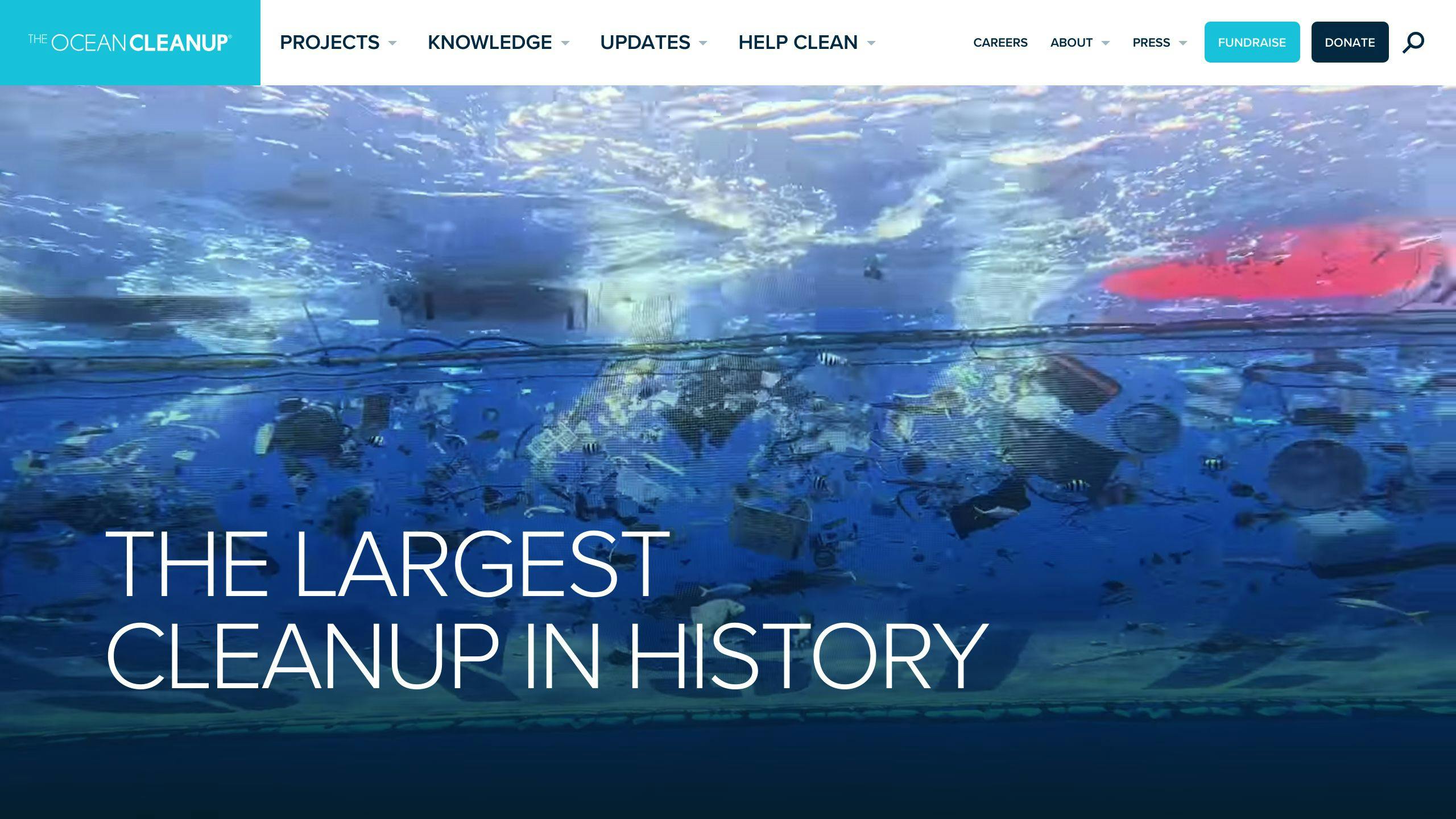
Mission and Approach
The Ocean Cleanup is a non-profit organization founded by Boyan Slat in 2013. Their mission is to remove plastic from the world's oceans. They focus on developing advanced technologies to collect plastic debris from the ocean and prevent further pollution.
Key Achievements
Here are some of The Ocean Cleanup's notable achievements:
- Developed System 03, a technology that collects plastic pollution at record levels
- Deployed Interceptor systems in rivers to prevent plastic from entering the ocean
- Partnered with organizations like The Coca-Cola Company, Maersk, and the Government of the Netherlands to support their mission
Global Reach and Impact
The Ocean Cleanup's efforts have a global impact. They aim to remove 90% of floating ocean plastic by 2040. Their technologies and solutions target reducing plastic pollution in the world's oceans.
Innovative Strategies
The Ocean Cleanup uses satellite data, marine scientists, and computer models to predict and collect plastic pollution. Their Interceptor systems target the 1000 most polluted rivers, which are responsible for 80% of plastic emissions into the oceans.
Educational Initiatives
The Ocean Cleanup supports the implementation of Sustainable Development Goal 14 and recognizes the importance of education in reducing ocean plastic. They work with organizations and governments to raise awareness about the impact of plastic pollution and promote sustainable practices.
3. Plastic Soup Foundation
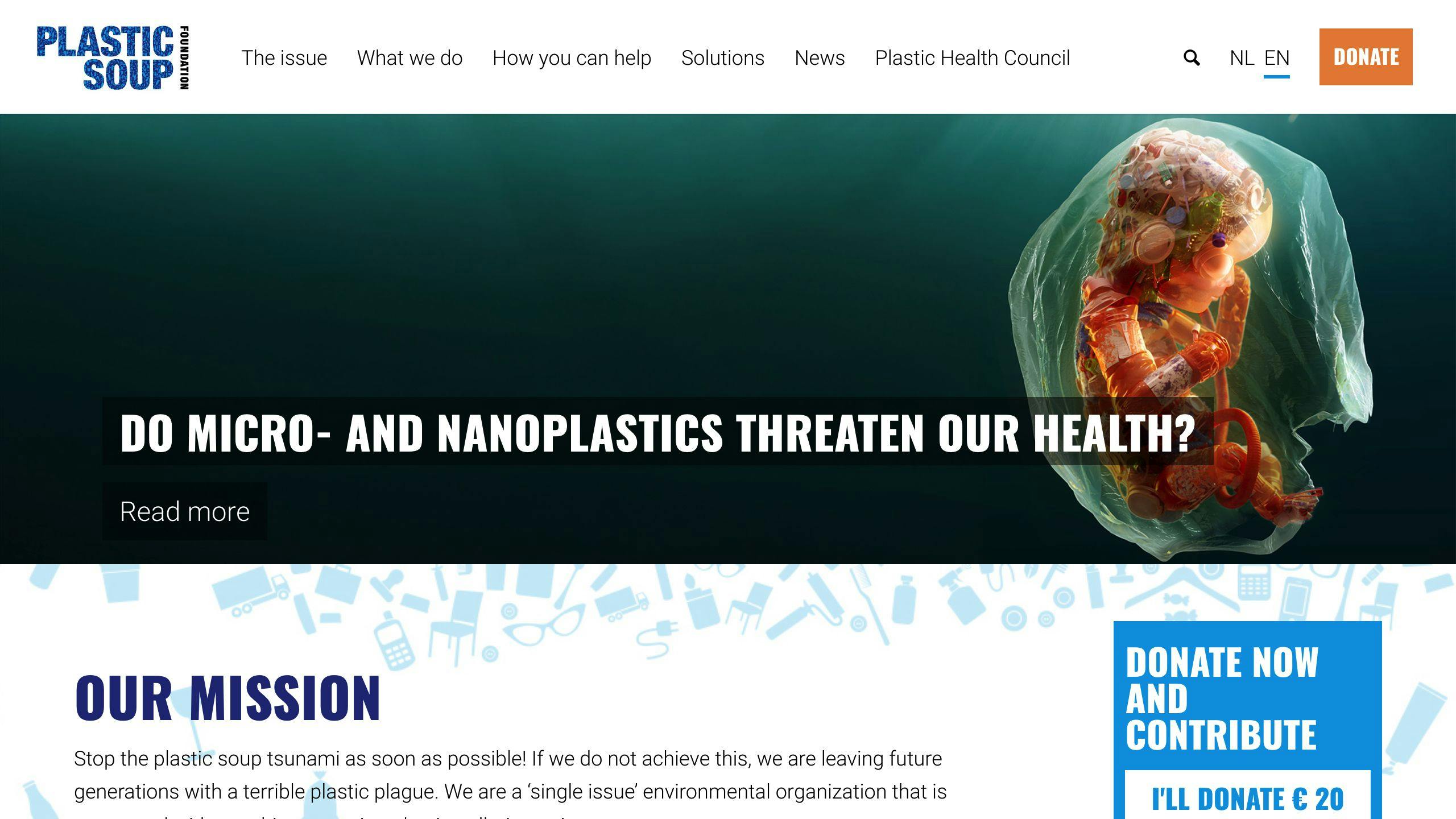
Mission and Approach
The Plastic Soup Foundation (PSF) is a non-governmental organization dedicated to reducing plastic contamination in the world's oceans. Founded in 2011, PSF focuses on preventing plastic waste from entering the ocean and promoting solutions to address the plastic problem. They work closely with experts, researchers, and enterprises to achieve their mission.
Key Achievements
PSF's notable achievements include:
- Beat the Microbead campaign, which started in 2012 and is now supported by 85 NGOs in 35 countries. This campaign aims to raise awareness about the impact of microbeads on the environment and promote alternatives to plastic microbeads.
Educational Initiatives
PSF focuses on education as a key strategy to address the plastic problem. They believe in teaching children early on that the plastic soup starts on their own doorstep. Through their website, social media channels, and educational programs, PSF disseminates scientific research results and promotes solutions for the plastic problem.
Innovative Strategies
PSF uses various innovative strategies to communicate and inform the public about the plastic problem. These include:
| Strategy | Description |
|---|---|
| Website | Disseminates scientific research results and promotes solutions |
| Social media channels | Reaches a wider audience and promotes awareness |
| Educational programs | Teaches children about the plastic problem and its solutions |
| Apps | Provides interactive tools to engage the public |
| Alternative solutions | Promotes biodegradable alternatives to plastic |
By supporting organizations like PSF, we can work together to reduce plastic pollution and promote sustainable living.
sbb-itb-1dc3f59
4. Parley for the Oceans
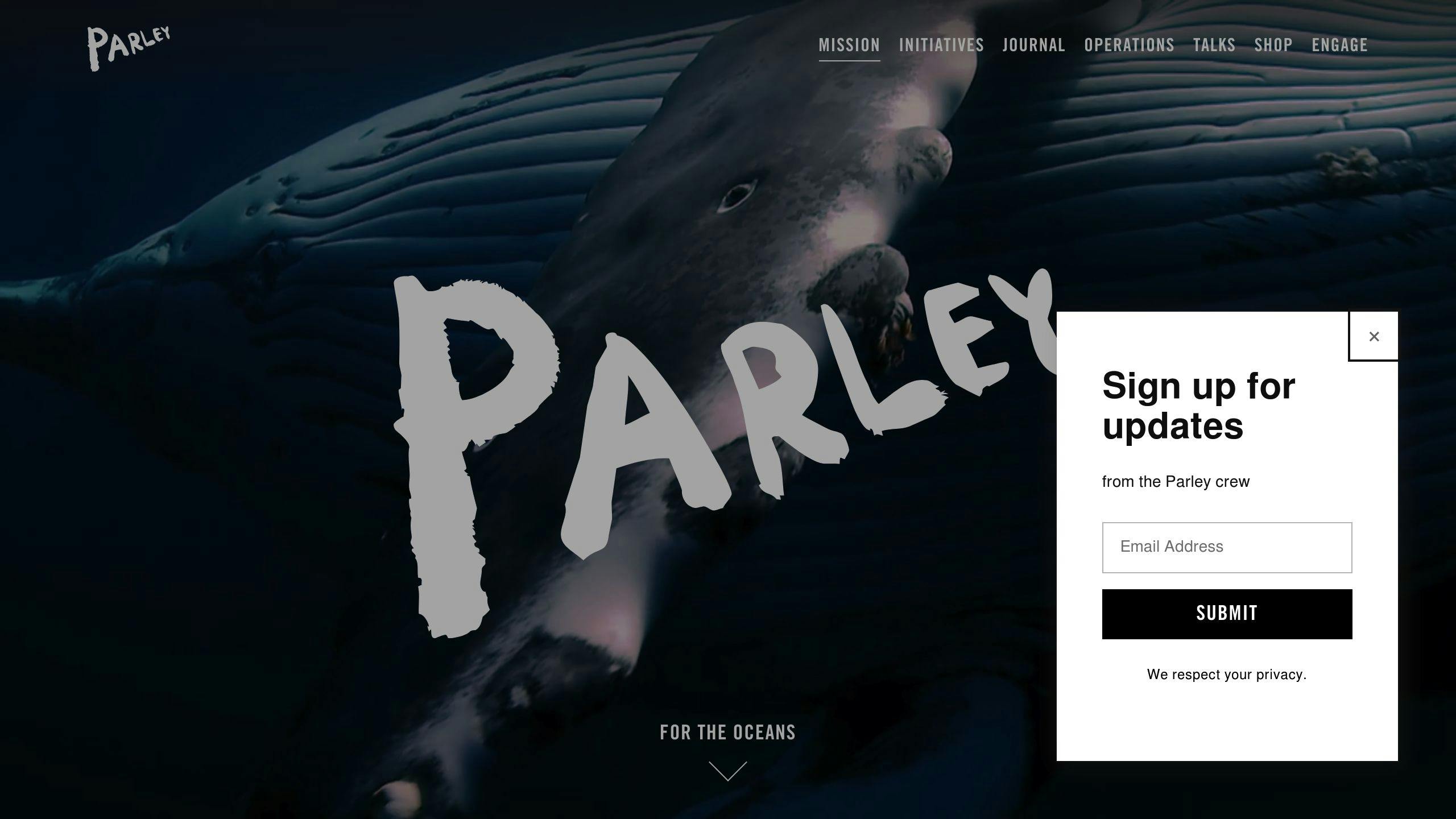
Mission and Approach
Parley for the Oceans is a global environmental organization that brings together creators, thinkers, and leaders to raise awareness about the beauty and fragility of the oceans and collaborate on projects to end their destruction. Their approach focuses on creativity, collaboration, and eco-innovation, with a focus on tackling plastic pollution through their AIR strategy: Avoid, Intercept, Redesign.
Key Achievements
Parley has achieved significant milestones in its mission to combat ocean pollution. Some notable achievements include:
- Collaborations with global brands: Parley has worked with brands like adidas, Dior, and American Express to create eco-innovative products and promote ocean conservation.
- Artist edition flags: Parley has created artist edition flags made from Ocean Plastic®, with proceeds supporting the Parley Global Cleanup Network.
- 3D printing applications: Parley has developed applications for 3D printing with Ocean Plastic®, including collaborations with artists, designers, material scientists, and robotics-industry innovators.
Innovative Strategies
Parley uses various innovative strategies to tackle ocean pollution, including:
| Strategy | Description |
|---|---|
| AIR strategy | Avoid, Intercept, Redesign to tackle plastic pollution |
| Collaborations | Partnerships with global brands and artists to promote ocean conservation |
| Eco-innovation | Development of new products and applications using Ocean Plastic® |
| Global Cleanup Network | Community-led cleanups to intercept plastic waste |
By supporting organizations like Parley, we can work together to reduce plastic pollution and promote sustainable living.
5. Surfrider Foundation
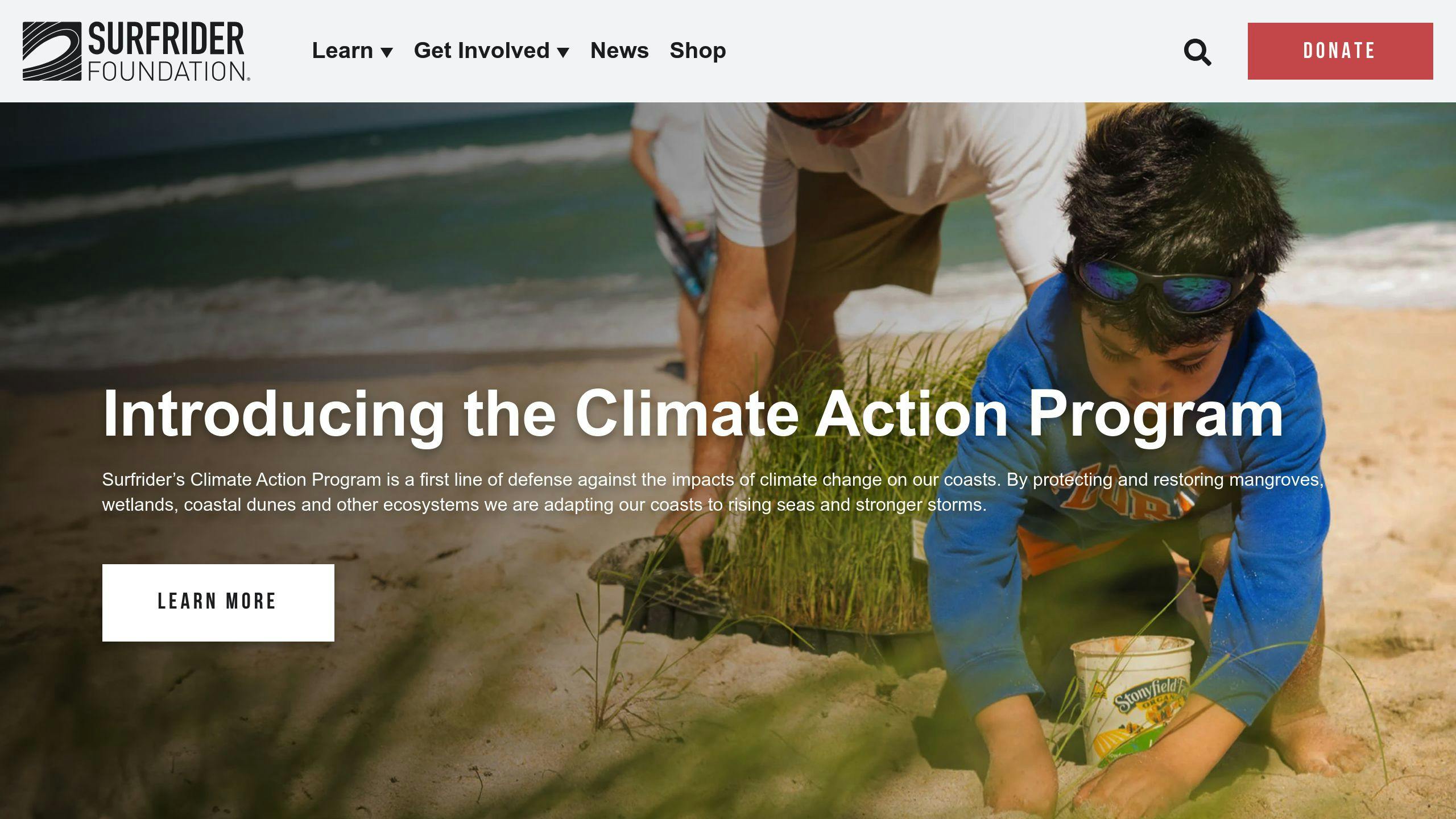
Mission and Approach
The Surfrider Foundation is a non-profit organization dedicated to protecting the world's oceans, waves, and beaches. They inspire and empower communities to take action in reducing plastic pollution and promoting sustainable living.
Key Achievements
Here are some of Surfrider Foundation's notable achievements:
- Beach Cleanup Program: They have removed over 29,966 pounds of trash and recycling from beaches in 2024 alone.
- Advocacy for source reduction: Surfrider Foundation has pushed for policies that reduce plastic production and promote sustainable practices.
- Ocean Friendly Restaurants initiative: They have certified businesses that meet certain criteria to reduce plastic waste and promote sustainable practices.
Innovative Strategies
Surfrider Foundation uses the following strategies to tackle ocean pollution:
| Strategy | Description |
|---|---|
| Beach Cleanup Program | Organizing community action to remove trash and debris from beaches |
| Advocacy for source reduction | Pushing for policies that reduce plastic production and promote sustainable practices |
| Ocean Friendly Restaurants initiative | Certifying businesses that meet sustainable criteria to reduce plastic waste |
By supporting organizations like Surfrider Foundation, we can work together to reduce plastic pollution and promote sustainable living.
Conclusion
The fight against microplastic pollution is a global effort that requires the collective action of organizations, governments, and individuals. The five NGOs highlighted in this article - 5 Gyres Institute, The Ocean Cleanup, Plastic Soup Foundation, Parley for the Oceans, and Surfrider Foundation - are leading the charge in this battle.
Each organization brings a unique approach to the table, from developing innovative technologies to advocating for policy change and educating the public. Their work is crucial in raising awareness about the devastating effects of microplastic pollution and promoting sustainable living.
What You Can Do
By supporting these organizations, you can contribute to the global effort to reduce microplastic pollution. Here are some ways to get involved:
| Action | Description |
|---|---|
| Donate | Support NGOs financially to help them continue their work |
| Volunteer | Participate in beach cleanups, events, and campaigns organized by NGOs |
| Spread Awareness | Share information about microplastic pollution on social media and with friends and family |
| Make Sustainable Choices | Reduce your use of single-use plastics and choose eco-friendly products |
Together, we can create a cleaner, healthier environment for ourselves and future generations.
FAQs
What NGOs are working to reduce plastic pollution?
Several organizations are actively working to reduce plastic pollution globally. Here are a few examples:
| NGO | Focus |
|---|---|
| 5 Gyres Institute | Research and advocacy to address plastic pollution |
| The Ocean Cleanup | Developing technologies to remove plastic waste from the oceans |
| Parley for the Oceans | Collaborating with artists, leaders, and businesses to raise awareness and drive solutions to plastic pollution |
| Surfrider Foundation | Protecting and preserving the world's oceans, waves, and beaches |
| Plastic Soup Foundation | Reducing plastic pollution in the environment |
These organizations, among many others, are dedicated to combating plastic pollution through various means, including education, research, advocacy, and community engagement.
